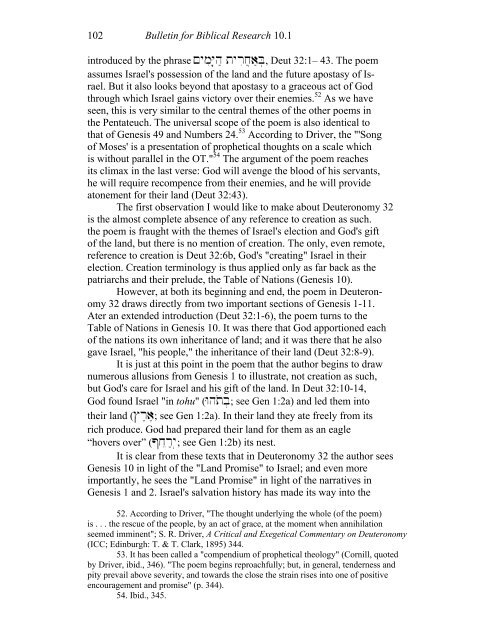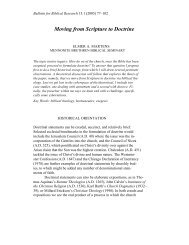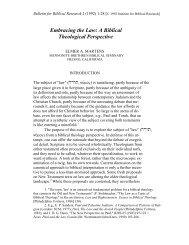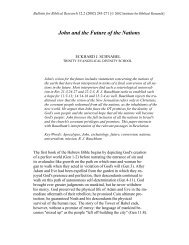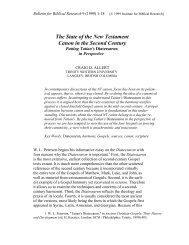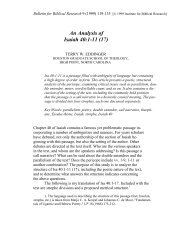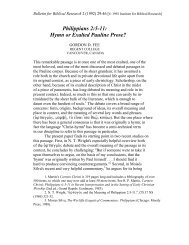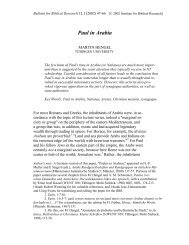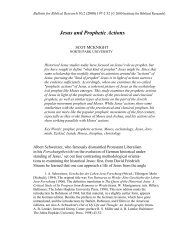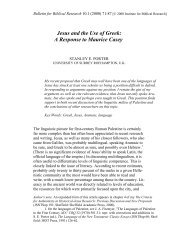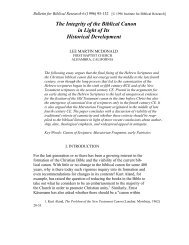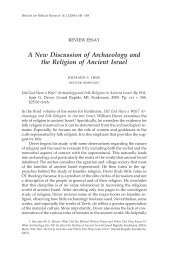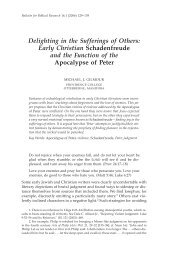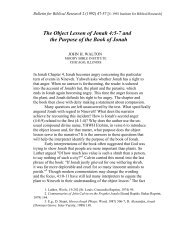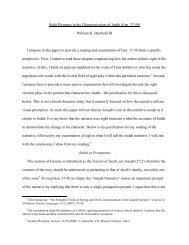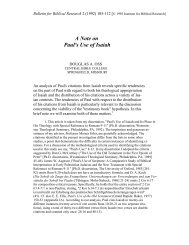Creation, Genesis 1-11, and the Canon - Institute for Biblical Research
Creation, Genesis 1-11, and the Canon - Institute for Biblical Research
Creation, Genesis 1-11, and the Canon - Institute for Biblical Research
Create successful ePaper yourself
Turn your PDF publications into a flip-book with our unique Google optimized e-Paper software.
102 Bulletin <strong>for</strong> <strong>Biblical</strong> <strong>Research</strong> 10.1<br />
introduced by <strong>the</strong> phrase Mymiy@fha tyrixj)ab;@, Deut 32:1– 43. The poem<br />
assumes Israel's possession of <strong>the</strong> l<strong>and</strong> <strong>and</strong> <strong>the</strong> future apostasy of Israel.<br />
But it also looks beyond that apostasy to a graceous act of God<br />
through which Israel gains victory over <strong>the</strong>ir enemies. 52 As we have<br />
seen, this is very similar to <strong>the</strong> central <strong>the</strong>mes of <strong>the</strong> o<strong>the</strong>r poems in<br />
<strong>the</strong> Pentateuch. The universal scope of <strong>the</strong> poem is also identical to<br />
that of <strong>Genesis</strong> 49 <strong>and</strong> Numbers 24. 53 According to Driver, <strong>the</strong> "'Song<br />
of Moses' is a presentation of prophetical thoughts on a scale which<br />
is without parallel in <strong>the</strong> OT." 54 The argument of <strong>the</strong> poem reaches<br />
its climax in <strong>the</strong> last verse: God will avenge <strong>the</strong> blood of his servants,<br />
he will require recompence from <strong>the</strong>ir enemies, <strong>and</strong> he will provide<br />
atonement <strong>for</strong> <strong>the</strong>ir l<strong>and</strong> (Deut 32:43).<br />
The first observation I would like to make about Deuteronomy 32<br />
is <strong>the</strong> almost complete absence of any reference to creation as such.<br />
<strong>the</strong> poem is fraught with <strong>the</strong> <strong>the</strong>mes of Israel's election <strong>and</strong> God's gift<br />
of <strong>the</strong> l<strong>and</strong>, but <strong>the</strong>re is no mention of creation. The only, even remote,<br />
reference to creation is Deut 32:6b, God's "creating" Israel in <strong>the</strong>ir<br />
election. <strong>Creation</strong> terminology is thus applied only as far back as <strong>the</strong><br />
patriarchs <strong>and</strong> <strong>the</strong>ir prelude, <strong>the</strong> Table of Nations (<strong>Genesis</strong> 10).<br />
However, at both its beginning <strong>and</strong> end, <strong>the</strong> poem in Deuteronomy<br />
32 draws directly from two important sections of <strong>Genesis</strong> 1-<strong>11</strong>.<br />
Ater an extended introduction (Deut 32:1-6), <strong>the</strong> poem turns to <strong>the</strong><br />
Table of Nations in <strong>Genesis</strong> 10. It was <strong>the</strong>re that God apportioned each<br />
of <strong>the</strong> nations its own inheritance of l<strong>and</strong>; <strong>and</strong> it was <strong>the</strong>re that he also<br />
gave Israel, "his people," <strong>the</strong> inheritance of <strong>the</strong>ir l<strong>and</strong> (Deut 32:8-9).<br />
It is just at this point in <strong>the</strong> poem that <strong>the</strong> author begins to draw<br />
numerous allusions from <strong>Genesis</strong> 1 to illustrate, not creation as such,<br />
but God's care <strong>for</strong> Israel <strong>and</strong> his gift of <strong>the</strong> l<strong>and</strong>. In Deut 32:10-14,<br />
God found Israel "in tohu" (w@htob; see Gen 1:2a) <strong>and</strong> led <strong>the</strong>m into<br />
<strong>the</strong>ir l<strong>and</strong> (Cre)e; see Gen 1:2a). In <strong>the</strong>ir l<strong>and</strong> <strong>the</strong>y ate freely from its<br />
rich produce. God had prepared <strong>the</strong>ir l<strong>and</strong> <strong>for</strong> <strong>the</strong>m as an eagle<br />
“hovers over” (Px"ray; see Gen 1:2b) its nest.<br />
It is clear from <strong>the</strong>se texts that in Deuteronomy 32 <strong>the</strong> author sees<br />
<strong>Genesis</strong> 10 in light of <strong>the</strong> "L<strong>and</strong> Promise" to Israel; <strong>and</strong> even more<br />
importantly, he sees <strong>the</strong> "L<strong>and</strong> Promise" in light of <strong>the</strong> narratives in<br />
<strong>Genesis</strong> 1 <strong>and</strong> 2. Israel's salvation history has made its way into <strong>the</strong><br />
52. According to Driver, "The thought underlying <strong>the</strong> whole (of <strong>the</strong> poem)<br />
is . . . <strong>the</strong> rescue of <strong>the</strong> people, by an act of grace, at <strong>the</strong> moment when annihilation<br />
seemed imminent"; S. R. Driver, A Critical <strong>and</strong> Exegetical Commentary on Deuteronomy<br />
(ICC; Edinburgh: T. & T. Clark, 1895) 344.<br />
53. It has been called a "compendium of prophetical <strong>the</strong>ology" (Cornill, quoted<br />
by Driver, ibid., 346). "The poem begins reproachfully; but, in general, tenderness <strong>and</strong><br />
pity prevail above severity, <strong>and</strong> towards <strong>the</strong> close <strong>the</strong> strain rises into one of positive<br />
encouragement <strong>and</strong> promise" (p. 344).<br />
54. Ibid., 345.


